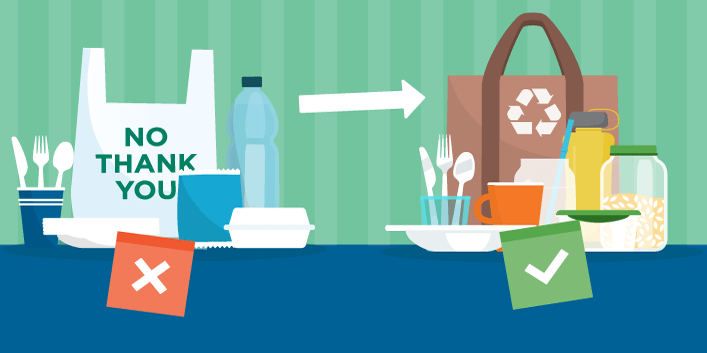
Attention, Lagos residents! In January 2024, the Lagos state government banned single use plastic and styrofoam plates. The ban was later suspended due to reactions from the general public and business owners. The suspension was carried out in a bid to give businesses owners time to transit to other alternatives. On Monday 19th of May 2025, Tokunbo Wahab the Lagos state commissioner for environment and water resources announced the full enforcement of the ban from 1st July, 2025.
For business owners in Lagos, this means a mandatory transition from plastic packaging to biodegradable alternatives.
First, what exactly are single-use plastics?
Single-use plastics are disposable items made from plastic that are intended to be used only once before being discarded. This includes common items like plastic bags (including pure water sachets and market shopping bags), bottled water, drinking straws often used with drinks like Zobo or Kunu, disposable plastic cutlery, takeaway plates and cups, and those popular takeaway food containers. Biodegradable packaging offers a much more sustainable solution.
The Lagos State Government is implementing this ban due to pressing environmental concerns and to address the issue of widespread littering in Lagos. As we all know, waste management is a significant challenge, and plastic pollution is a major contributor. Additionally, the use of plastic packaging can have serious health implications, which we will explore.
Let’s delve into the health concerns by focusing on a chemical called BPA (Bisphenol A), commonly used in plastic production.
What is BPA?
According to an article by Bernedette Cuffari on news medical and life sciences, BPA stands for Bisphenol A and It is a chemical used in the manufacturing of certain plastics, such as some water bottles, plates, and plastic bags. BPA is widely used to enhance the durability and resilience of plastics. However, when used in food products, BPA can leach from the container into the food we consume, potentially affecting our health. With widespread use of BPA, repeated exposure, even in small amounts, can lead to various health issues, particularly those affecting hormone regulation. These include potential links to diabetes, obesity, cardiovascular problems, respiratory issues, kidney problems, and even certain types of cancer, especially breast cancer in women.
Other Health and Environmental Concerns Related to Plastics:
- Chemical Leaching: Plastics can release harmful chemicals, such as phthalates, into food, especially when exposed to heat or when storing substances like meat or cheese. As mentioned, BPA can disrupt hormones and is associated with diabetes, obesity, and heart disease.
- Microplastic Contamination: Microplastics, which are tiny plastic particles invisible to the naked eye, can enter our food chain, especially seafood. These microplastics can trigger inflammation in the body, cause stress, and potentially damage our organs. This is a serious concern in Nigeria, where seafood is a significant part of the diet.
- Air Pollution from Burning Plastics: The open burning of plastic waste, a common practice in many areas, releases toxic gases into the atmosphere, causing respiratory problems. This practice needs to stop to protect public health.
Furthermore, let’s compare BPA to another material Polyphenylene Ether (PPE). BPA is a chemical additive that strengthens certain plastics but poses health risks due to its potential to leach into food, affecting hormones. In contrast, PPE is a type of high-performance plastic used in industrial applications. It is generally considered safe for food contact as it is less reactive and doesn’t leach harmful substances into food. In Nigeria, we highly value our health, so it’s crucial to understand these distinctions.
Further research indicates that BPA can lead to issues like diabetes, obesity, and even breast cancer, while PPE is considered safer for food packaging. This highlights that not all plastics are the same, and the choice of material matters significantly.
For more information about these harmful chemicals in plastic, click HERE to read the complete article from medical and life sciences.
This is not meant to cause alarm but rather to raise awareness about the potential health risks associated with plastic food packaging. For business owners, switching to biodegradable packaging is a proactive and necessary step before enforcement begins.
In one of our previous posts, we discussed the benefits of biodegradable materials. Please read it HERE.
At Aquada Box, we provide biodegradable, eco-friendly and sustainable packaging solutions that are not harmful to the health and environment, and can assist you in transitioning from plastic to more sustainable options.
Stay informed and engaged! Follow us on Instagram @aquada_box and packhub.ng for more updates, tips, and insights into better packaging practices.
